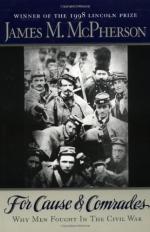
|
| Name: _________________________ | Period: ___________________ |
This quiz consists of 5 multiple choice and 5 short answer questions through Chapter 7, On the Altar of My Country.
Multiple Choice Questions
1. After the battle of Shiloh, which of the following Generals for the 53rd Ohio, promised his men--after an hour lecture--that they would fight with artillery behind them in the next battle?
(a) General George Brinton McClellan.
(b) General James Abram Garfield.
(c) General Pierre Gustave Toutant Beauregard.
(d) General William T. Sherman.
2. As McPherson begins to describe the training regimen kept by soldiers, he quotes a young man from Indiana who wrote what relative, complaining a soldier "is not his own man"?
(a) Mother.
(b) Aunt.
(c) Cousin.
(d) Sister.
3. When the 7th Vermont was called forward in June 1862, which of the following regiments pouted while Vermont celebrated?
(a) 12th Connecticut.
(b) 2nd Ohio.
(c) 14th Vermont.
(d) 9th Pennsylvania.
4. After the battle of Fredericksburg, which famous writer visited his brother, a lieutenant in the 51st New York, after the man had been wounded?
(a) Upton Sinclair.
(b) Henry James.
(c) Walt Whitman.
(d) John Steinbeck.
5. As McPherson describes how soldiers on both sides were spoiling for a fight, he mentions an expression denoting exciting experiences: see the _________?
(a) Canary.
(b) Donkey.
(c) Elephant.
(d) Bear.
Short Answer Questions
1. After the discussion of "short-timers" psychology, McPherson notes what percentage of 3-year enlisted Union soldiers from 1861 reenlisted?
2. In the discussion of the officers' views on training, which of the following did a captain in the 85th New York NOT believe would get men to fight well?
3. A private from which state recounted an amazing amount of energy while describing the battle of Gaines Mill?
4. When a Quaker captain in the 5th New Jersey was threatened to be turned out of his faith if he did not resign, he found he could not leave and was later killed in which battle?
5. When discussing the assertions of patriotism as a motivation for fighting, what percentage of the 429 Confederate letters and diaries used as sources affirmed this motivation?
|
This section contains 306 words (approx. 2 pages at 300 words per page) |

|




